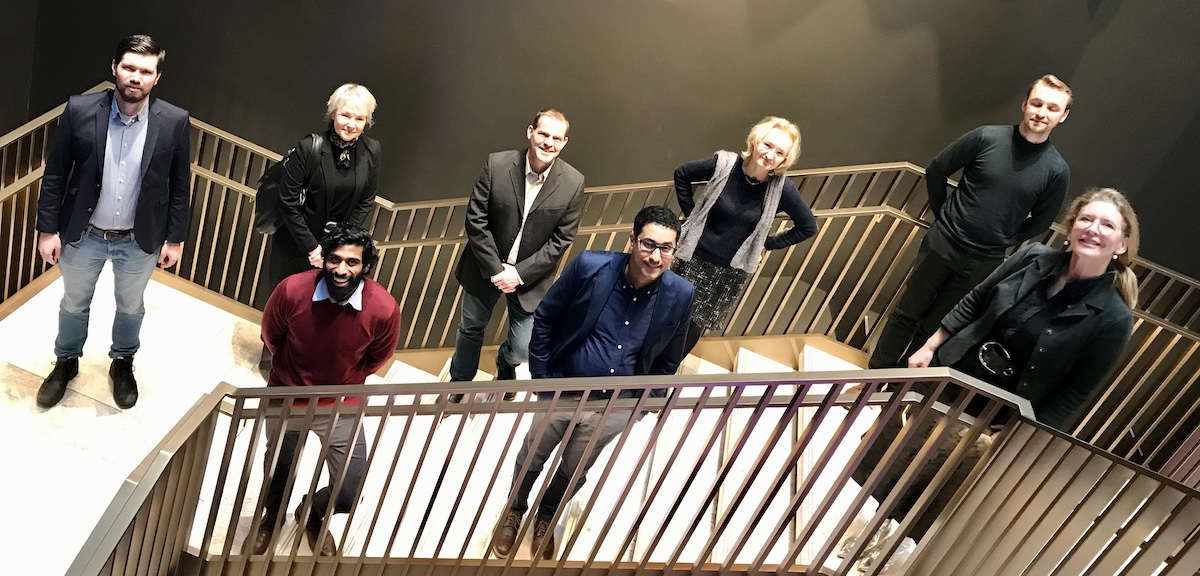AI-Mind: an innovative solution that will revolutionize early detection of dementia

Project coordinator
The AI-Mind project has received funding from the European Union’s Horizon 2020 research and innovation programme, and is a five-year Research and Innovation Action (RIA) that officially starts in March 2021. It is led by Ira Haraldsen, head of the Cognitive Health Research group at the Department of Neurology, involves fifteen project partners from eight European countries and has a budget around 14 million Euro. The European funded research project stands out for intelligent digital tools for screening of brain connectivity and dementia risk estimation in people affected by mild cognitive impairment.
Artificial intelligence for dementia prevention
AI-Mind is a 5-year project funded by Horizon 2020, with the goal of facilitating a paradigm shift in clinical practice, is starting on March 1, 2021. AI-Mind will create intelligent digital tools for screening of brain connectivity and dementia risk estimation in people affected by mild cognitive impairment.
 During its lifecycle, two new artificial intelligence-based digital tools will be developed by AI-Mind. The AI-Mind Connector will identify dysfunctional brain networks, and the AI-Mind Predictor will assess dementia risk using data from the Connector, advanced cognitive tests, and genetic biomarkers. These two tools will be integrated into an intelligent diagnostics platform to identify both brain network disturbances and dementia risk, creating personalized patient reports for further intervention recommendations.
During its lifecycle, two new artificial intelligence-based digital tools will be developed by AI-Mind. The AI-Mind Connector will identify dysfunctional brain networks, and the AI-Mind Predictor will assess dementia risk using data from the Connector, advanced cognitive tests, and genetic biomarkers. These two tools will be integrated into an intelligent diagnostics platform to identify both brain network disturbances and dementia risk, creating personalized patient reports for further intervention recommendations.
Dementia affects tens of million worldwide
Currently, there are over 50 million people living with dementia across the globe. By 2030 we can expect that number to reach 82 million. Besides time-consuming patient investigations with low discriminative power for dementia risk, current treatment options focus on late symptom management. This has numerous implications in terms of familial, medical, and care costs.
Delaying the decline dementia causes will significantly reduce the overall medical and social costs for patients and lessen the pressure on insurance companies and healthcare systems. Studies have consistently shown that the average medical, non-medical, and indirect costs for individuals with dementia are higher compared to those without dementia. Many underestimate the overall economic burden of dementia as many non-trivial components of costs, such as direct non-medical costs and indirect costs, are not included in the cost estimates.
AI-Mind enables earlier preventative therapies
The risk of dementia can be reduced by adopting healthy lifestyle habits and managing treatable conditions such as diabetes and high blood pressure. Thanks to the AI-Mind tools, the time to make a diagnosis, which can take several years with current technologies, could be reduced to only one week. This gives doctors and patients a window for preventive interventions, therapies, and rehabilitation measures early in the course of the disease.
With the currently available technology, many patients receive their diagnosis only after the onset of dementia. As a consequence, there might not be the opportunity to start preventive therapies. For people with mild cognitive impairment (MCI), the dementia risk is almost 30% higher than unaffected individuals. Therefore, we need effective diagnostic tools for early dementia risk assessment and intervention for people with MCI.
The doctor’s new best friend: AI
What are now complex, labour-intensive, costly, and poorly predictive screening methods for mild cognitive impairment (MCI) shall be replaced by automated diagnostic screening tools. These are driven by artificial intelligence to address the urgent need for early accurate diagnosis and risk prediction.
About AI-Mind
The Norwegian coordinated AI-Mind project has received substantial funding from the European Union’s Horizon 2020 research and innovation program under grant agreement No 964220. AI-Mind is a five-year Research and Innovation Action (RIA) that officially starts in March 2021, with a budget of EUR14 million.
Fifteen project partners, from eight European countries, including academic institutions, medical centres, SMEs and patient organizations, make up the AI-Mind consortium: Tallinn University from Estonia, Aalto University and Helsinki University Hospital from Finland, Oslo University Hospital, BrainSymph AS, DNV-GL, and Oslo Metropolitan University from Norway, Scientific Institute for Research, Hospitalization and Healthcare, San Raffaele Pisana, Neuroconnect Srl, Università Cattolica del Sacro Cuore from Italy, Radboud University Medical Center from the Netherlands, Alzheimer Europe from Luxembourg, Complutense University of Madrid (and Universidad Politécnica de Madrid as third party) and Lurtis Rules from Spain, and accelopment Schweiz AG from Switzerland.
The role of Oslo University Hospital:

It is an honor for Oslo University Hospital to coordinate this wonderful consortium which comprises excellent researchers in neuroscience and computer science, from 5 clinical centres, who closely collaborate with 3 SMEs contributing unique technologies, an established data governance body (Det Norske Veritas, DNV GL), and Alzheimer Europe. Together, we plan to deliver a medical device of class 2b that can reach TRL7 by the end of the project. AI-Mind represents a major step forward in the risk assessment of dementia. Clinicians will promptly advise therapies to delay the onset of disease, and patients will enjoy independent lives for longer. By offering a globally accessible, cheap and precise tool for dementia pre-diction, AI-Mind will improve the health care system and boost innovation by shifting the R&D of pharmaceutical organisations and other companies to preventive diagnostic methods and therapies for dementia.
AI-mind is a partnerproject of DigitalLife Norway. Supporting organisations: CLAIRE and NORA.

Front row: Harry Hallock, Anis Yazidi, Ira Haraldsen
Links:
CLAIRE - Confederation of Laboratories for Artificial Intelligence Research in Europe
NORA - Norwegian Artificial Intelligence Research Consortium
Home page of Ira Haraldsen's Cognitive Health Research group
Contact information:
| Project Coordinator Ira Haraldsen Oslo University Hospital Email ira.haraldsen@icloud.com M: +47 920 11 533 |
For media Email: contact@ai-mind.eu |
Web page https://www.ai-mind.eu |
